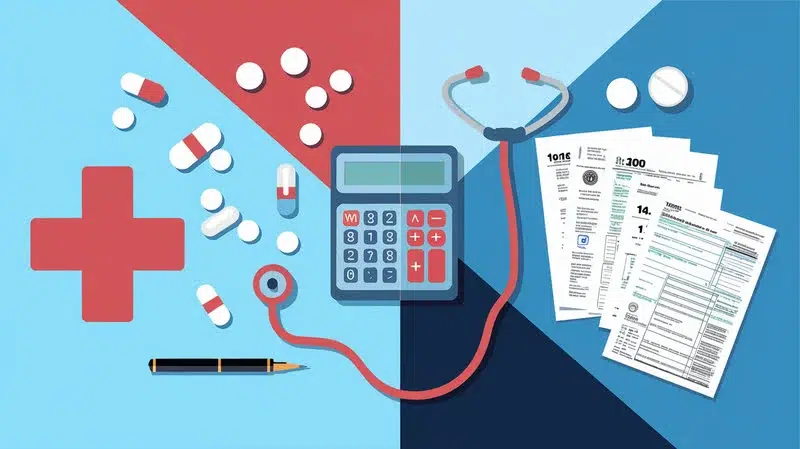As a sole proprietor, understanding what you can and cannot deduct on your taxes is crucial for effective financial management. One common question that arises is: can sole proprietors deduct medical expenses? This article will explore the eligibility, limitations, and the process you need to follow to maximize your deductions.

Level Up Your Mileage Tracking
MileageWise: Tracks trips automatically via vehicle movement, Bluetooth, and Plug’N’Go without draining your battery.
AI-Powered Mileage Recovery: The AI Wizard helps reconstruct past mileage logs, filling gaps in your log to ensure compliance.
Built-in IRS Auditor: Checks and corrects up to 70 logical errors in logs, ensuring they meet IRS standards for tax deductions.
Web Dashboard & Team Collaboration: Manage logs, import trips, and collaborate with teams through the web dashboard, ideal for businesses.
Try it for free for 14 days. No credit card required!

Understanding Medical Expense Deductions
Before diving into the specifics for sole proprietors, it’s essential to understand what medical expense deductions are. Medical expenses can include a variety of costs related to health care, such as:
- Doctor visits
- Hospital stays
- Prescription medications
- Dental care
- Vision care
These expenses may be deductible when calculating your taxable income, but there are specific rules and limitations that apply.
Eligibility for Sole Proprietors
As a sole proprietor, you can deduct medical expenses, but only under certain conditions. Here’s what you need to know:
1. Itemized Deductions
To deduct medical expenses, you must itemize your deductions on Schedule A of your Form 1040. This means you forego the standard deduction, which might not be beneficial for everyone. You can only deduct the amount of your total medical expenses that exceeds 7.5% of your adjusted gross income (AGI).
2. Qualified Medical Expenses
Not all medical expenses qualify for a deduction. You can only deduct expenses that are considered necessary and reasonable. Some examples include:
- Payments to doctors and hospitals
- Long-term care insurance premiums
- Costs for medical equipment like wheelchairs or crutches
However, expenses that are purely cosmetic or not medically necessary are typically not deductible.
3. Self-Employment Health Insurance Deduction
Another potential deduction for sole proprietors is the self-employment health insurance deduction. This allows you to deduct 100% of your health insurance premiums directly from your income before calculating your adjusted gross income. This deduction is available regardless of whether you itemize your deductions or take the standard deduction.
How to Calculate Your Medical Expense Deduction
Calculating your medical expense deduction involves a few steps:
- Determine Your AGI: Calculate your adjusted gross income, which includes all sources of income minus specific deductions.
- Calculate 7.5% of Your AGI: Multiply your AGI by 0.075 to find the threshold amount for your medical expenses.
- Add Up Your Medical Expenses: Total all qualifying medical expenses for the tax year.
- Subtract the Threshold: Subtract the 7.5% of your AGI from your total medical expenses. The remaining amount is what you can deduct.
Common Mistakes to Avoid
When it comes to deducting medical expenses, sole proprietors often make several common mistakes. Here are some to watch out for:
- Not Keeping Records: Failing to keep detailed records of your medical expenses can lead to missed deductions. Always save receipts and documents related to your medical care.
- Overlooking Non-Traditional Expenses: Some expenses, like mileage for trips to the doctor, may also be deductible, but they require careful tracking.
- Confusing Personal and Business Expenses: As a sole proprietor, it’s important to differentiate between personal medical expenses and those related to your business. Only business-related expenses are deductible.
Conclusion
In summary, sole proprietors can indeed deduct medical expenses, but they must itemize their deductions and ensure that their expenses exceed 7.5% of their adjusted gross income. Additionally, the self-employment health insurance deduction provides an excellent opportunity to lower taxable income without the need to itemize.
Always consult with a tax professional to ensure you are taking full advantage of the deductions available to you. Staying informed about tax laws and maintaining organized records will help you navigate the complexities of medical expense deductions effectively.
By understanding the rules, tracking your expenses, and avoiding common pitfalls, you can maximize your deductions and keep more of your hard-earned money in your pocket. Remember, it’s your responsibility to be aware of the tax code and how it applies to your specific situation as a sole proprietor.
Recommended Reading:
IRS Standard Mileage Rates for 2024 & 2025
Self-Employed Quarterly Taxes: The Basics
Top Tax Write-Offs Every Self-Employed Professional Should Know


